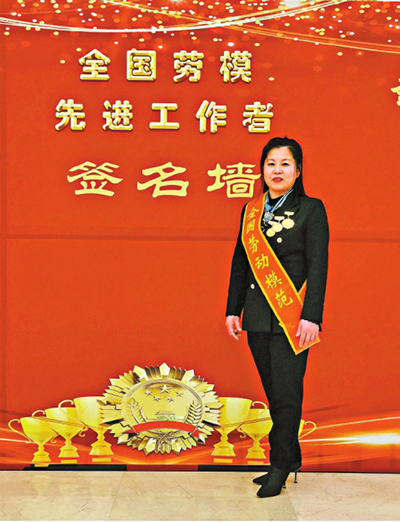NPC deputy leads locals out of poverty, committed to rural vitalization

After building a successful career of growing black fungus, Ju Xiuqin, a deputy to the National People's Congress (NPC) in Baoqing county of Northeast China's Heilongjiang province, has devoted herself to developing a specialized cooperative, opening a mushroom farm and spearheading other programs to lead locals out of poverty.
Mushrooms aid poverty alleviation
Ju began growing black fungus in 2003 and, after a successful start, invested 300,000 yuan ($47,490) in 2007 to build the Xinmiao Mushroom Farming Cooperative in the county's Baoqing town.
The cooperative's products were sold to Beijing, Shenzhen, Shanxi, Hebei and other regions, with an annual income of more than 4 million yuan. In 2019, the cooperative received an honorary title from the provincial authority in recognition of its quality services to agriculture, rural areas and farmers, collectively known as "sannong" in China.
Through a business model that combines the cooperative, farms and farmers, Ju has led 96 poverty-stricken households to grow mushrooms and also provided over 8,000 job opportunities to women, persons with disabilities and temporary workers. Thanks to her efforts, six registered poverty-stricken households in the county’s Wanjinshan township were able to get rid of poverty.
In 2018, Ju founded a new mushroom farm in Baoqing's Shuangquan village, covering an area of 63,000 square meters with a total investment of 20 million yuan. In the same year, she was elected as a deputy to the top legislature and has since kept in mind her mission to serve the people.
To make the mushroom industry a competitive hallmark of Baoqing's economy, she tried hard to shore up her management through study and also motivated members of the cooperative to cultivate new mushroom varieties, develop new techniques and explore online marketing channels. The key to increasing farmers' income and realizing rural vitalization is to enhance development via industries with local characteristics, she said.
Speaking up for farmers
In order to lead locals to shake off poverty and live better lives, the NPC deputy has paid close attention to the rural land transfer program, which faced new challenges in the northeastern province amid the adjustment of national macro policies.
After in-depth researches, Ju submitted a suggestion on advancing large-scale operations of rural land transfer at the annual NPC session in 2019. She recognized the progress made in the rural land transfer program in Heilongjiang, where the program was seen as a key path to rural vitalization, and pointed out pertaining problems, such as limited transfer forms, dominance by grain farmers and family farms, information gap, and an incomplete land price assessment system.
Ju called for an introduction of laws and regulations on land transfers and the establishment of a market for rural land transfers, as well as a more active role for rural property rights trading centers in order to create a fair, just and open environment for the program.
A believer in professionalism, Ju also urged relevant departments to establish a training mechanism to help farmers gain new skills and explore new job opportunities. She also called for cultivation of professionals who know about land management.
"The country's rural vitalization strategy has boosted my confidence," Ju said, adding that the cooperative plans to invest 7 million yuan to build a factory of mushroom growing kits this year.
"We find and play to our strengths, and we will definitely be able to increase farmers' incomes. There are so many things I can do this year," Ju said.
In the interest of farmers
As an NPC deputy, Ju also paid attention to the treatment of pesticide containers.
In late 2021, she visited the Shuangyashan city procuratorate in the province to learn about handling of public interest litigation cases.
She was briefed by the acting chief procurator that the city’s procuratorate had made active efforts in collection, transportation and treatment of pesticide containers, issuing recommendations to those liable to fulfill their public interest responsibilities and establishing hundreds of temporary collection sites at the county, town and village levels.
Ju said rural development should not be achieved at the expense of the environment. Proper treatment of pesticide containers is a must to prevent pollution of arable land and protect the rural environment, she added.
Ju said she will submit a suggetion on formulating new regulations to clarify the responsibilities of pesticide producers and retailers and establish a comprehensive recycling system in the upcoming NPC session. Treatment facilities should be approved and encouraged in certain regions to dispose of the containers, Ju said.
- Top legislature schedules standing committee session for late February
- China's top legislator meets with Uruguayan president
- Senior legislator surveys Anhui on formulating outline of provincial 15th Five-Year Plan
- China's top legislator meets with British PM
- NPC deputies see more engagement with top court



